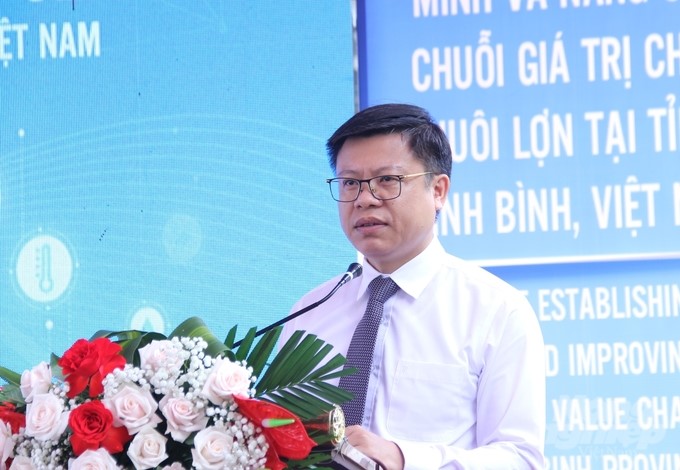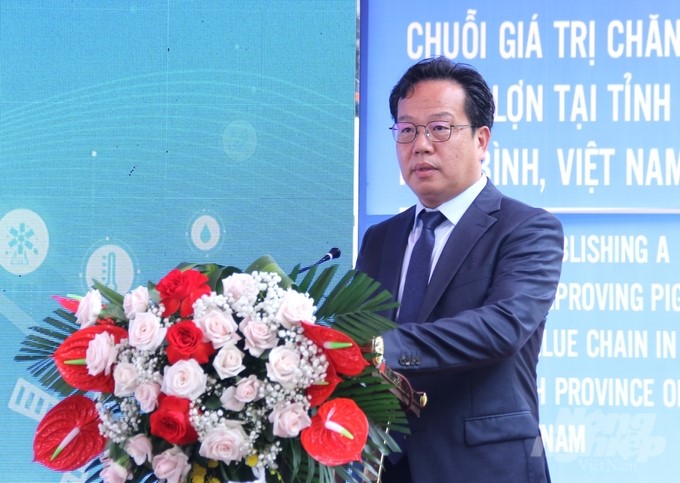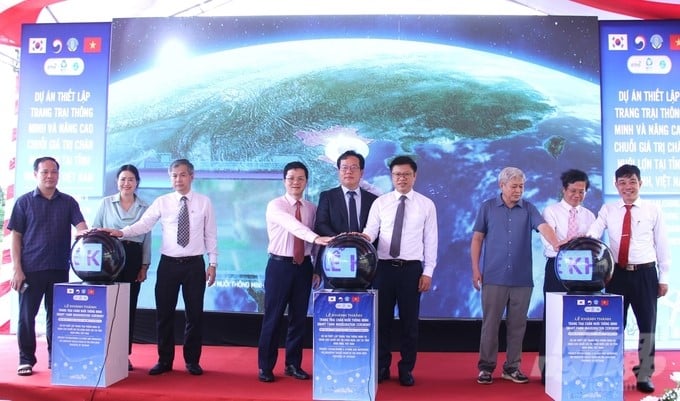May 23, 2025 | 20:24 GMT +7
May 23, 2025 | 20:24 GMT +7
Hotline: 0913.378.918
May 23, 2025 | 20:24 GMT +7
Hotline: 0913.378.918

According to Mr. Nguyen Quoc Toan, lessons from the smart pig farm project will be valuable experience for effectively implementing next projects. Photo: Trung Quan.
This is an activity within the "Project on Establishing a Smart Farm and Strengthening the Pig Farming Value Chain in Ninh Binh Province," sponsored by the South Korean Government with a non-refundable budget of more than USD 3 million.
The project is implemented in the 2022–2025 period at the Tam Diep Nuclear Pig Breeding Research and Development Station in Khe Goi village, Quang Son commune, Tam Diep city, Ninh Binh province. The Center for Digital Transformation and Agricultural Statistics (Ministry of Agriculture and Rural Development – MARD) is the project owner on the Vietnamese side.
The project's goal is to provide high-quality and safe food for consumers and increase productivity and income for farmers through the application of smart agricultural production models along the agricultural product value chain.
The project includes five components: installing a smart pig farm model (post-weaning barn of 216 m2 and pig barn for sale of more than 467 m2); developing a software system to operate farm and provide vaccines, pig breeds, and livestock materials; training and technology transfer (domestic and foreign) on high-tech livestock farming, data management, and smart farm operation; developing a policy report on smart pig farm development; and developing project documents and marketing project products.
Mr. Nguyen Quoc Toan, Director of the Center for Digital Transformation and Agricultural Statistics (Project Director on the Vietnamese side), shared: Currently, Vietnam is orienting to develop a safe, responsible, high-tech, and smart agricultural sector associated with digital transformation in all fields of the economy.
Therefore, putting the smart pig farm into operation not only proves the strong cooperative relationship between Vietnam and South Korea but also affirms that Vietnam's orientations are correct and well received the support and concern of the international community.
Besides, the project opens up opportunities for cooperatives, farmers, management agencies, and businesses to share and learn many practical lessons in the process of implementing the smart pig farming model. Lessons learned from the project will be valuable experience for effectively implementing next projects.

According to Mr. Lee Sung Ho, introducing smart farm technology to the model farm in Ninh Binh province will bring many great values. Photo: Trung Quan.
Mr. Lee Sung Ho, Project Director of the South Korean side, assessed that introducing smart farm technology to the model farm in Ninh Binh province is expected to bring many great values. For example, contributing to the production of high-quality, safe pork; reducing production costs and work for laborers; increasing livestock productivity; improving reproductive performance of pigs; reducing mortality rate in pigs; and increasing efficiency of animal feed use.
Currently, the cost of producing pork in South Korea is very high. South Korean consumers spend USD 3 to buy 1 kg of pork. Therefore, South Korea is having to import pork from many different countries. Thus, through this project, it is hoped that by applying smart farm technology, Vietnamese pig farming enterprises can export high-quality and safe pork to South Korea.

Leaders of the Center for Digital Transformation and Agricultural Statistics, Department of Animal Health, Department of Livestock Production, National Institute of Animal Science, Thuy Phuong Pig Research and Development Center, etc., and South Korean partners pressed the button to inaugurate the smart pig farm. Photo: Trung Quan.
Mr. Lee Sung Ho also proposed cooperation in exchanging smart pig farm data between Vietnam and South Korea. In addition, cooperate technology between a South Korean smart farm enterprise and a Vietnamese pig farming equipment enterprise. Because if the strengths of Vietnamese and Korean enterprises are combined, it is possible to establish a smart farm business with global competitiveness.
At the same time, establish pig farming areas specializing in production for export purposes in regions with favorable conditions for production and distribution, such as Ninh Binh province. This is a feasible direction if we choose a safe area for disease prevention and discuss in advance the disease prevention conditions of the importing country.
Previously, the MARD, in coordination with South Korea's Ministry of Agriculture, Food, and Rural Affairs, organized the "Construction Commencement Ceremony for the Project on Establishing a Smart Farm and Strengthening the Pig Farming Value Chain in Ninh Binh."
Through the project, the two parties will collaborate to construct a demonstration model of a smart pig-breeding farm in Ninh Binh province, utilizing cutting-edge technology to guarantee the utmost quality of products for domestic consumption and export.
Translated by Thu Huyen

(VAN) The People's Committee of Tra Vinh province has approved an adjustment to the investment policy for the Green Hydrogen Plant project, increasing its area to approximately 52.76 hectares.
![Reducing emissions from rice fields: [2] Farmers’ commitment to the soil](https://t.ex-cdn.com/nongnghiepmoitruong.vn/608w/files/news/2025/05/05/dsc08881jpg-nongnghiep-140632.jpg)
(VAN) Clean rice cultivation model in Thuong Tan commune, Bac Tan Uyen district, is assisting local residents in achieving sustainable agriculture by substantially reducing costs, increasing productivity, and protecting the environment.

(VAN) At the conference to disseminate Resolution No. 68, AgriS introduced its digital agricultural ecosystem and reaffirmed its commitment to accompanying the Government in promoting private sector development and sustainable agriculture.

(VAN) 'Blue Ocean - Blue Foods' initiative is designed to restore marine ecosystems and establish sustainable livelihoods for local communities by cultivating a minimum of 1,000 hectares of cottonii seaweed in the first three years.
/2025/05/21/4642-3-112707_603.jpg)
(VAN) The V-SCOPE project has made direct contributions to three out of six pillars of the Comprehensive Strategic Partnership between Vietnam and Australia.

(VAN) Facing the threat of rabies spreading to the community, Gia Lai province urgently carries out measures to vaccinate dogs and cats on a large scale.

(VAN) Disease-free livestock farming not only protects livestock herds but also stabilizes production and livelihoods for many farmers in Tuyen Quang.